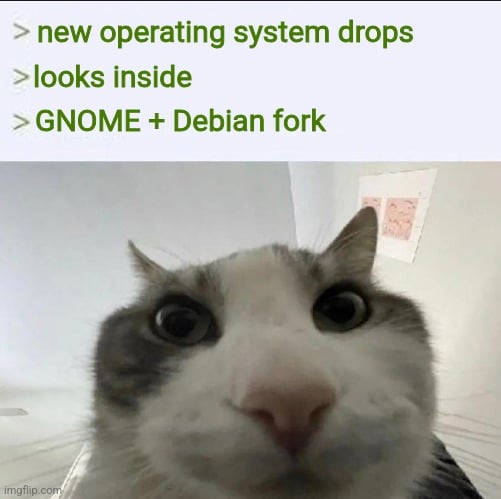- cross-posted to:
- [email protected]
- [email protected]
- [email protected]
- cross-posted to:
- [email protected]
- [email protected]
- [email protected]
The day has come! I have been pretty excited for this release since Vanilla OS 2 was announced. I will have to try it out as soon as I can
Exciting. I’ll have to give it a spin on my hardware
Might this be the one for my father? He drowns in Windows, I don’t want to think what Linux can do to his brain. I kept a Windows SSD to help him troubleshoot any problem he stumbled upon, but it died last week and all my attempts to install it on another SSD were met with the setup asking me for drivers, no matter what I tried to provide, I never got past that screen. So I don’t know what to do, I guess I’ll just wait and see, but I’m already eyeing some options.
I don’t know how old your father is or what they do on their systems. However, for elderly people, for which I just want to setup the system and forget, I tend to go with Endless OS. It’s more limited and more mature than Vanilla OS. But, if that’s exactly what you want, I’m simply unaware of anything better out there.
Tbh it is a solid story about the os. I’m using silverblue but it made me curious.
I’ve been looking forward to this release!
Mmm looks very interesting, I will give this a try.

memes aside it does look pretty neat - simple .apk installs, yaml system configs, automatic boot rollback, easy multi-gpu support - all solid user focused features - will have to see how it develops but so far it seems like a better alternative to the likes of PopOS
GNOME + Debian
Into the trash it goes.
I wouldn’t say it’s “better,” but merely different. Until immutable distros can easily solve installing certain software that requires system-level access (like VPN clients without a Linux package or repo), there will always be a place for mutable distros.
And I say that as a proponent of distros like NixOS, Bazzite, and blendOS.
I’m running ProtonVPN on Bluefin from a flatpak with zero issues.
Yep, and it’s one of the only VPNs with a flatpak. It works great when the software can be easily layered. Meanwhile, Private Internet Access comes as a
.runexecutable tarball.Until immutable distros can easily solve installing certain software
So… it’s easily solved then?
Not currently. Unless you have a good guide on how to build a flatpak that has more examples than launching a “Hello world” bash script.
You can do that with fedora Atomic tho, just enable it, also why install a VPN? Why you can’t use OpenVPN?
I can, actually, but I’d rather use WireGuard for the improved throughput. There’s no “enabling” Private Internet Access’s client, though, because it’s a self-executing tarball and install script, and that’s the only way to access their WG endpoints.
They have a manual connection client through the command line, but that hasn’t been updated in over two years, and I don’t feel comfortable using it.
I haven’t used it myself, but from what I’ve read VanillaOS has that covered pretty well with APX?
I haven’t really looked at that one, so I’ll have to take a look and see what it can do (and what its limitations are). I saw that it containerizes software by default, and something like VPN software can’t usually run in a simple container, since it usually tries to manage network connections, and would need unique permissions.
AFAIK it’s based on Distrobox, which allows you to work in containers with access to key host services that you need, which I think should be sufficient for a VPN.
(In fact, for VPNs specifically Flatpaks are sufficient as well - I’m using Mozilla VPN via a Flatpak.)
Private Internet Access doesn’t come as a flatpak, deb, or rpm, unfortunately. I’d have to build my own and come up with a way to automatically build it so I don’t have to manually do it each time PIA releases a new update.
Podman containers via distrobox don’t work well for PIA, for whatever reason, so if I decide to pursue that, I’ll likely have to learn podman. I’m currently trying to install PIA during the build process of a custom uBlue image, and that has its own challenges.
Basically, PIA is making me consider switching to another provider just to be done with it. 😅
You might want to reconsider PIA anyway: https://restoreprivacy.com/kape-technologies-owns-expressvpn-cyberghost-pia-zenmate-vpn-review-sites/
I’m aware of the controversy. I haven’t had issues, and neither has anyone else that has mentioned they use it (I would think if they were logging and selling user data, the Movie and Music industries would be customers #1 and #2, and we’d hear about ISP letters more often). Still, it’s a factor to consider in one’s threat model, and I would be lying if I said I was completely comfortable with their past.
Uhm…is this recommended for a beginner to at?
It would be largely fine, but be careful. Being immutable, a lot of things that you would expect will work differently or not at all. I would not recommend it, but if you’re in for a challenge, it’s not bad.
I’m still using windows 10 right now and playing with Linux Mint and Nobara every once in a while.
Based on that description, I will pass for the time being.
You could take a look at one of the universal blue distros next time you want to try some linux https://universal-blue.org/
I use bazzite on my gaming pc and bluefin on my laptop. It is immutable linux, but the devs made the defaults really nice (for me at least)
I can vouch for Bazzite. It’s at the point where you don’t really have to do any tinkering. The only thing I really had to configure some extra beyond the defaults was pipewire, allowing different sample rates for my USB audio DAC.
Things like what?
You have to spend a few seconds to actually learn how the apps install. By default you can only install flatpaks but they have containers to install apps from any distro too. You can’t install apps natively unless you use one extra command.
It just had its first Stable release (as Vanilla OS 2). Therefore, consider to wait it out a bit until it has been well-tested at large. Until then, please feel free to choose something else that is to your liking. Like, what is it that attracted you to this one in the first place?
They could benefit a lot using BTRFS instead of LVM Thin Provisioning, putting ext4 in LVM has worse performance than BTRFS
Still a shame it isn’t based on the best distro in the world as it was initially planned.
EDIT: this was misinformation. Idk if I was hallucinating again or I confused it with another distro (e. g. BlendOS) but VanillaOS was never meant to be based on Arch.
Thanks for the EDIT because I thought I had really missed something.
I am addicted to Arch and the AUR but it is precisely that it is NOT Arch that makes Vanilla look attractive. Do I REALLY need multiple new kernels per month like Arch gives me?
Having a more stable base sounds like a great idea. Using containers to get access to the Arch repositories and the AUR on top of Debian sounds even better. Vanilla bakes support for that scenario right in.
People really don’t get jokes anymore
I got your joke ( it was not subtle ). I have absolutely no idea why that would prevent me from making my comment.
I’m afraid basing their distro off TempleOS would be a bit too hard.
It was planned to be based on Arch
btwfyi.Very curious. I didn’t know this. I tried verifying this, but didn’t manage to do so.
So, I got to ask; Was this just a joke? Or is there (some) truth to this claim?
I would take a lot of time to find. Search in old TLE videos I guess. If he made news about it, there should be links to the sources too.
OTOH one gets Holly C, so it might be worth.
OK but Debian is the best distro outside of this world.
The operating system used for key station functions is the Debian Linux distribution.[258] The migration from Microsoft Windows to Linux was made in May 2013 for reasons of reliability, stability and flexibility
Bruh I thought Arch jokes were obvious but ok










